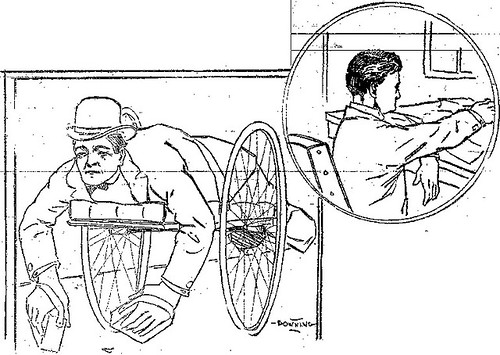For those of you who missed the announcement in last Sunday’s Globe, it was announced that the Carthage Historic Preservation, Inc., will be running a historic home tour next month (click on the link for descriptions of the featured homes). The tour will run from 10 am to 4pm on December 4th for a price of $20 at the door, but buying a ticket in advance will save you $5. A tea will also be available for $6, and Christmas/Winter themed paintings by regional artists will be available for purchase. It’s a great chance to enjoy history quite literally from the inside out. For those of you who love turn of the century homes and just don’t get the chance to visit them often enough, next Saturday will be an opportunity not to be missed.
Carthage Attorney Charles Wild: Defying the Odds
Although he was a citizen of Carthage, Charles Wild’s story is worth mentioning on Historic Joplin. As a young boy growing up in Sarcoxie, Wild suffered a bout of scarlet fever. He was left crippled and unable to walk. Wild, however, was undeterred.
Although he could not play baseball or swim in a country stream, Charles Wild focused on his studies. It was said that as a mere boy he took over as the bookkeeper and business assistant in his father’s nursery in Sarcoxie. Later, when he was older, Charles attended St. Louis Law School (now called St. Louis University). After graduation he opened a successful law practice in St. Louis before he returned to Sarcoxie in 1906 and became the law partner of H.T. Harrison of Carthage.
What made Charles Wild unique was that although he was unable to walk, he still managed to travel all over town with the aid of a cart that was described as a, “small box-like affair hung between two large rubber-tired wheels resembling those of a bicycle. The box of the cart is just large enough to admit his body and in this, when he desires to move around, he is strapped. Then, leaning forward, he propels himself by pulling himself along with his hands. He carries wooden blocks which he uses to preserve his hands.”
Wild could travel faster than the average pedestrian unless there was snow on the ground when “it is almost impossible for him to make any progress.” In addition, “rough roads and in wet and muddy weather” were a hindrance.
Despite his physical challenges, he was an accomplished author and attorney, with some of his work published in contemporary publications such as Harper’s and Century Magazine. He was noted as “an advocate of great ability before a jury. His physical condition is no handicap to his prowess as a speaker.” Wild would often ask to be taken from his cart and seated in a chair, “his head barely showing above the edge of the table” when he delivered “some of the most highly polished arguments and addresses ever hard in a tribunal of justice in this county.”
Wild, it was noted, “was respected by everyone, a friend to whom one can go in time of need, he is not only one of the most able but one of the most beloved men in Carthage.” He depended “upon his own abilities for making his way in the world” and he certainly did.
Source: Joplin Globe

